D.H. Lawrence and Cornwall: in search of utopia
At first glance this book suggests little relevance to Australian readers, being largely about an English writer and Cornwall, his favourite part of England.
Like most history, however, nothing is that simple.
READ REVIEW
↓
D.H. Lawrence and Cornwall: in search of utopia
Philip Payton | 2024
Philip Payton is a history professor at Flinders University, and Professor Emeritus at University of Exeter. He is a widely respected senior historian, particularly concerning Cornwall, Celtic mythology, and DH Lawrence.
Essentially, this book traces David Herbert and his wife Frieda Lawrence’s time in Cornwall and their ill-informed and failed attempts to create what one might describe as a pacifist utopia.
David and Frieda Lawrence moved to Cornwall early during the First World War in hope of escaping militaristic violence – and possible conscription. They believed that Cornwall was not really part of England, or at least English culture, it being fundamentally Celtic. Somehow this morphed, in the Lawrences’ minds, into the idea that in Cornwall they could create their own ideal, albeit very small, world. ‘Now was the time to reach out for something new… something bold, something that would offer a real alternative to urban-industrialised England, where like-minded and equally committed people of good will could work together to create a living utopia’, writes Payton.
They called this attempt to build utopia ‘Rananim’, a name loosely based on ‘ranani’ from a Hebrew version of psalm 33. This occurred during what Payton calls Lawrence’s ‘Messianic phase’, when he thought he could save England and build a new Jerusalem. Cornwall was ‘the Promised Land, on which to create a new heaven and a new earth’.
The couple acquired a large, isolated property named ‘Higher Tregerthen’, which had magnificent ocean views, and invited others to join them. Several fellow writers such as Philip Heseltine, John Westlake, Meredith Starr, Katherine Mansfield and Cecil Gray came – but none stayed very long. David and Frieda were highly strung, strongly opinionated, had an occasionally violent relationship, and seemed to have limited social skills. They made several attempts at living with others – perhaps like-minded people – but never managed to cope with communal living. Given their personalities and idiosyncrasies, this utter failure is readily understandable.
It is unclear in this book whether or not the Lawrences had any knowledge about or understanding of other utopian ventures – or even of the extensive utopian literature of the time. I suspect not – given their naïve approach. They abandoned their dream of ‘Rananim’ in late 1917.
The Lawrences arrived in Australia in May 1922, and lived briefly at Thirroul, between Wollongong and Sydney. There DH Lawrence wrote Kangaroo, based on his experiences in England, and as a response to what he observed, or at least thought he observed, during his three months in Australia. One weakness with D.H. Lawrence and Cornwall: in search of utopia is that the author never clearly defines what he means by ‘utopia’, let alone what the Lawrences intended by the term.
Otherwise, this is a superb book if one is studying the works of D H Lawrence, particularly Kangaroo, or if one is interested in the history of northwest Cornwall.
D.H. Lawrence and Cornwall: in search of utopia is published by University of Exeter Press.
Reviewer: Dr William J Metcalf, PHA (Queensland), author of Brisbane: Utopian Dreams and Dystopian Nightmares (2022).

